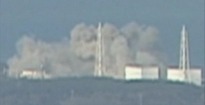Japan Nuclear Crisis "Verges On Catastrophe"
 The New York Times reports:
The New York Times reports:
TOKYO — Japan’s nuclear crisis verged toward catastrophe on Tuesday after an explosion damaged the vessel containing the nuclear core at one reactor and a fire at another spewed large amounts of radioactive material into the air, according to the statements of Japanese government and industry officials.
In a brief address to the nation at 11 a.m. Tokyo time, Prime MinisterNaoto Kan pleaded for calm, but warned that radiation had already spread from the crippled reactors and there was “a very high risk” of further leakage. Fortunately, the prevailing winds were sweeping most of the plume of radioactivity out into the Pacific Ocean, rather than over populated areas.
The sudden turn of events, after an explosion Monday at one reactor and then an early-morning explosion Tuesday at yet another — the third in four days at the plant — already made the crisis at the Fukushima Daiichi Nuclear Power Station the worst nuclear accident since the Chernobyl reactor disaster a quarter century ago.
It diminished hopes earlier in the day that engineers at the plant, working at tremendous personal risk, might yet succeed in cooling down the most damaged of the reactors, No. 2, by pumping in sea water. According to government statements, most of the 800 workers at the plant had been withdrawn, leaving 50 or so workers in a desperate effort to keep the cores of three stricken reactors cooled with seawater pumped by firefighting equipment, while the same crews battled to put out the fire at the No. 4 reactor, which they claimed to have done just after noon on Tuesday.
That fourth reactor had been turned off and was under refurbishment for months before the earthquake and tsunami hit the plant on Friday. But the plant contains spent fuel rods that were removed from the reactor, and experts guessed that the pool containing those rods had run dry, allowing the rods to overheat and catch fire. That is almost as dangerous as the fuel in working reactors melting down, because the spent fuel can also spew radioactivity into the atmosphere.
After an emergency cabinet meeting, the Japanese government told people living within 30 kilometers, about 18 miles, of the Daiichi plant to stay indoors, keep their windows closed and stop using air conditioning.
Mr. Kan, whose government was extraordinarily weak before the sequence of calamities struck the nation, told the Japanese people that “although this incident is of great concern, I ask you to react very calmly.” And in fact, there seemed to be little panic, but huge apprehension in a country where the drift of radioactivity brings up memories of Hiroshima and Nagasaki, the haunting images of post-war Japan.
Click here to read more.

